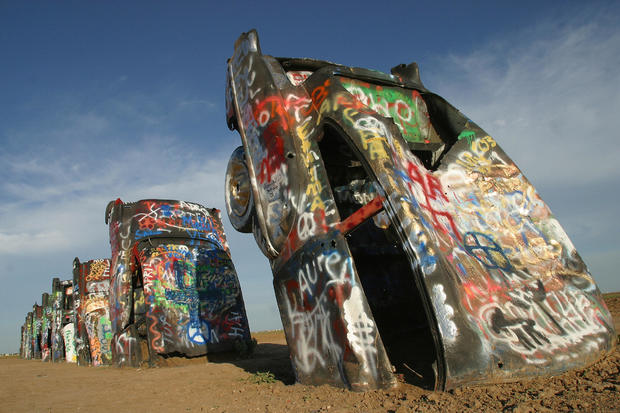Stanley Marsh 3, artist and creator of "Cadillac Ranch," dies at 76
AMARILLO, Texas -- Eccentric Texas businessman-turned-artist Stanley Marsh 3, whose partially buried row of Cadillacs became a road-side tourist attraction in the 1970s, died Tuesday. He was 76.
Marsh, long known in his hometown of Amarillo as a prankster and philanthropist but who faced indictment alleging he molested teenage boys late in life, died in Amarillo, his criminal attorney, Paul Nugent, said.
An heir to his family's oil-and-gas fortune, Marsh was a quirky but successful banker and television executive. But he was best known for his art, most notably "Cadillac Ranch," a row of 10 graffiti-splattered cars seemingly standing on their noses along Interstate 40 west of Amarillo.
The display gained national attention and quickly became a tourist attraction in 1974, after Marsh commissioned the Ant Farm, a radical art and design collective, to build it. The cars - acquired from junkyards, private owners and used car lots - were moved a mile west in 1997, and over the years were repainted.
But in 2012, when Marsh was 74, several lawsuits were filed alleging he'd paid two boys, ages 15 and 16 at the time, for sexual acts. He settled the lawsuits the next year, but was indicted two months later on charges that accused him of sexually assaulting six teenagers in recent years. Marsh denied the allegations and vowed to fight them in court.
Marsh's creations include a mesa painted to look as if it were floating and a football field-sized pool table hidden in the Panhandle terrain that only could be seen from the air. Hundreds of his mock road signs popped up in Amarillo neighborhoods, bearing such slogans as "Big Deal" and "My Grandmother Can Whip Your Grandmother."
But he'd been pulling pranks in Amarillo long before.
"By nature I'm an introvert, and I'm a shy person," Marsh once said. "When I do these stunts, which cause a great deal of attention, I can kind of shift gears and act like a master of ceremonies."
While Marsh is best known for the Cadillac Ranch, CBS affiliate KDFA notes he also funded many art projects around Amarillo, including the Dynamite Museum, the Floating Mesa and Ozymandias.
Marsh was born on Jan. 31, 1938, in Amarillo. His father and grandfather made their fortunes in the oil and gas business, but Marsh didn't follow in their footsteps. His given name was Stanley Marsh "III," but he changed it to "3'' because he thought the former was pretentious.
His creative bent began as a child and included carving swords and painting with watercolors. He said someone once told him that made him an artist.
"It's a lot better to be an artist than to be just somebody who makes things, so I said, 'Of course I'm an artist.' I'll take that any day," he told The Associated Press in 2009. "Artists are great people."
He earned his bachelor's degree in economics and master's degree in American civilization from the University of Pennsylvania. He and his wife, Wendy, adopted five children and had numerous grandchildren, and lived in Toad Hall, a 300-acre estate on the outskirts of Amarillo.
When he returned to Amarillo after college in the late 1960s, he quickly impressed those who knew him as a prankster with his business skills by heading a local bank. Then in 1967, using some of his family's money, Marsh purchased KVII-TV and turned it into the city's top-rated television station within a few years.
Marsh retired and sold the station in 2002, but he continued to go to his office and pursue his artistic endeavors.
Marsh once invited Amarillo citizens taller than 6-foot-4 to a reception for a group of Japanese businessmen to ensure the myth of the tall Texan ensued. In 1975, Marsh showed up at the Washington bribery trial of then-U.S. Treasury Secretary John Connally, a Texan accused in a milk-price scandal, dressed in a fringe Western jacket and carrying a pail of cow dung.
Despite such antics, Marsh bristled at suggestions he was eccentric and his pursuits were childish. He said he considered himself mature and responsible, a "leader of men who is doing what I want to do, and more people should be like me." But some felt he went too far.
In 1994, Marsh was accused of locking a local teenager in a chicken coop and threatening him with a hammer for stealing one of the hundreds of diamond-shaped street signs he'd placed around town, some of which read: "Steal This Sign." Marsh later pleaded no contest to two misdemeanors.
Although his art and shenanigans were often public, Marsh said he never wanted to be figured out. In 1994, he said he wanted his epitaph to read in part: "Thanks, everybody. I had a good time."
